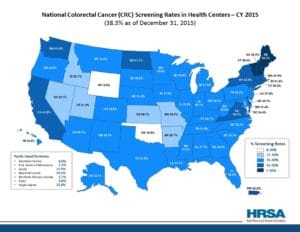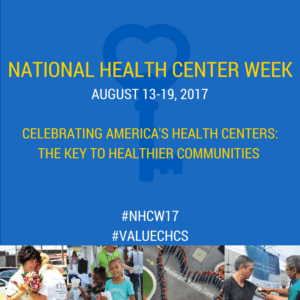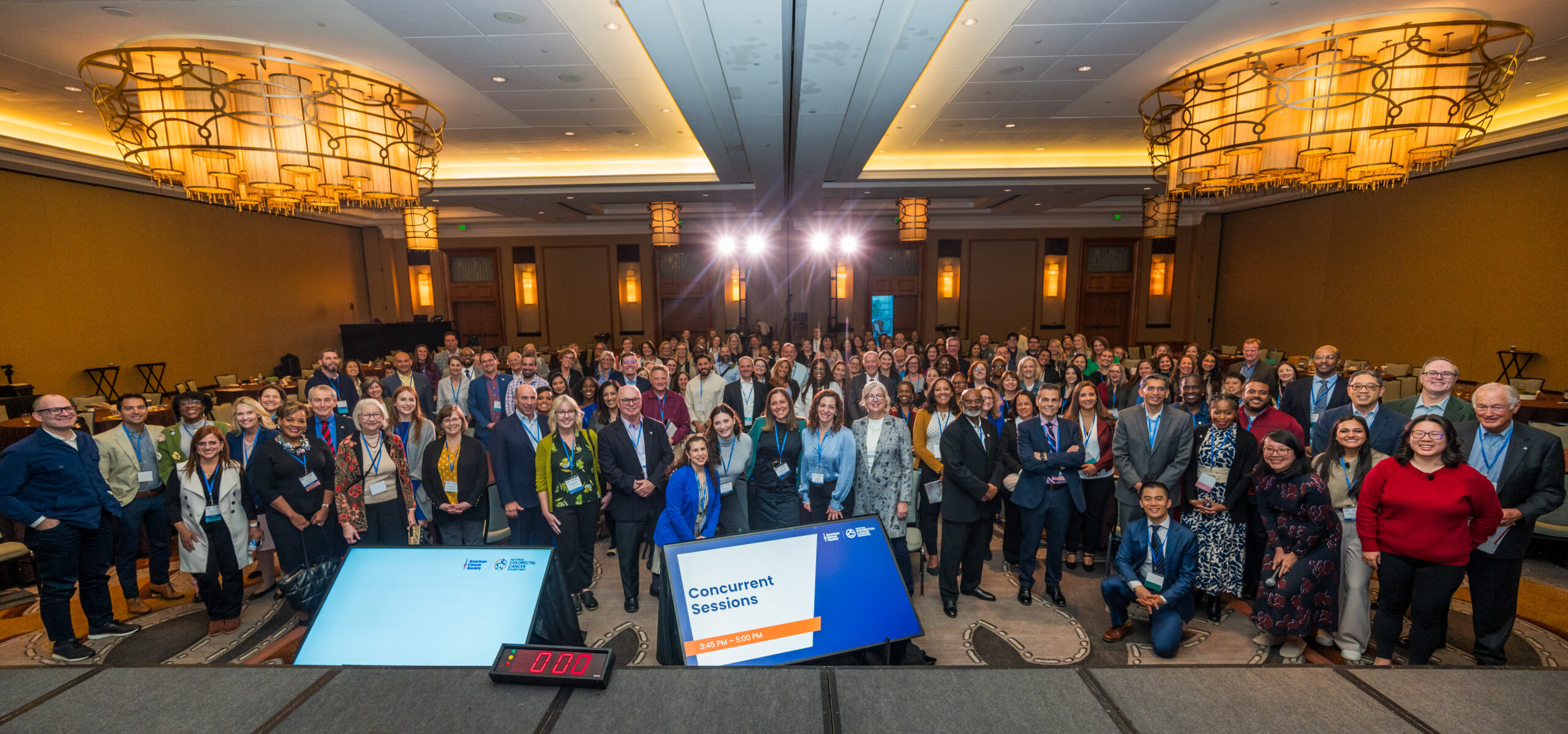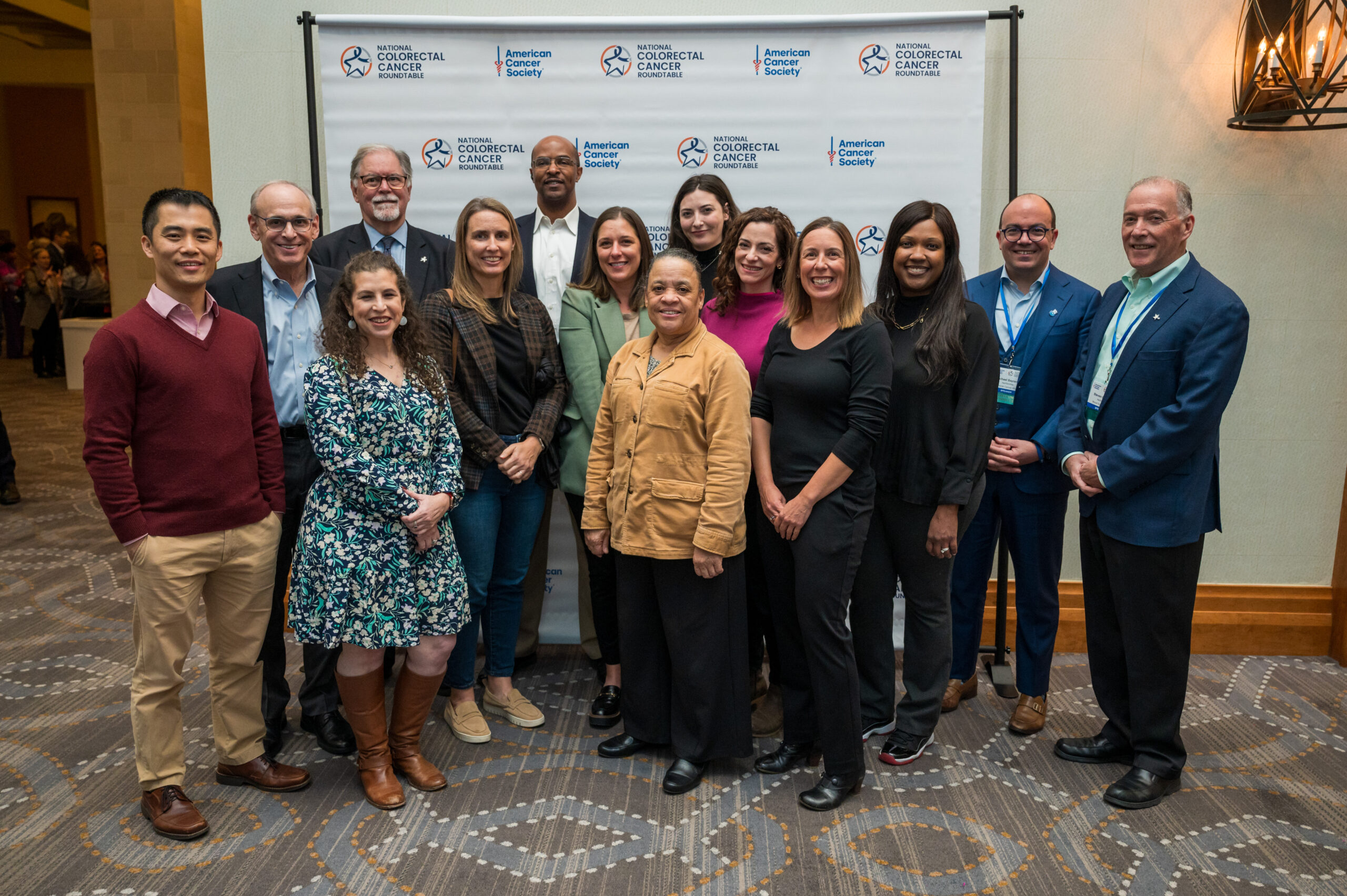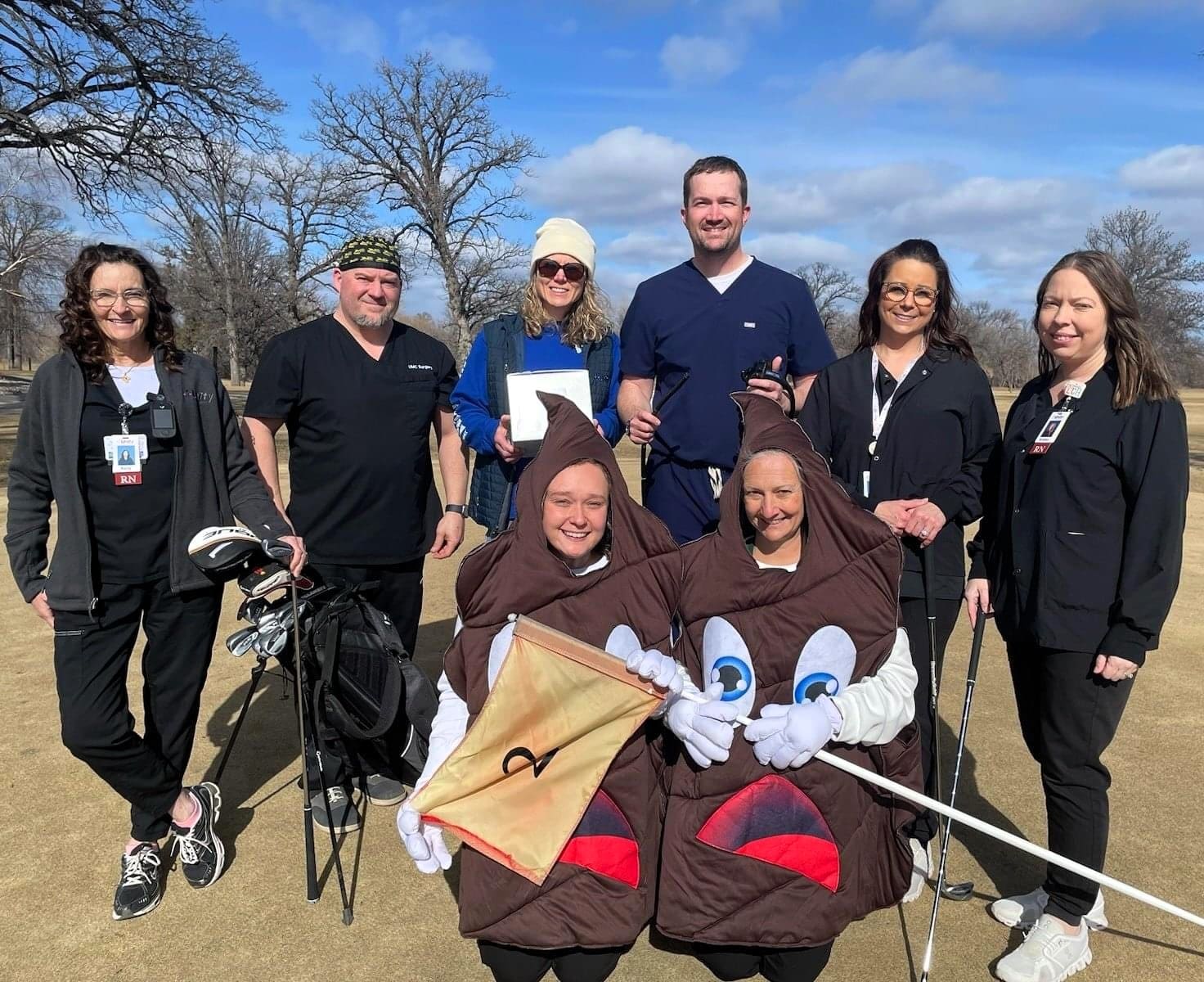Celebrating National Health Center Week
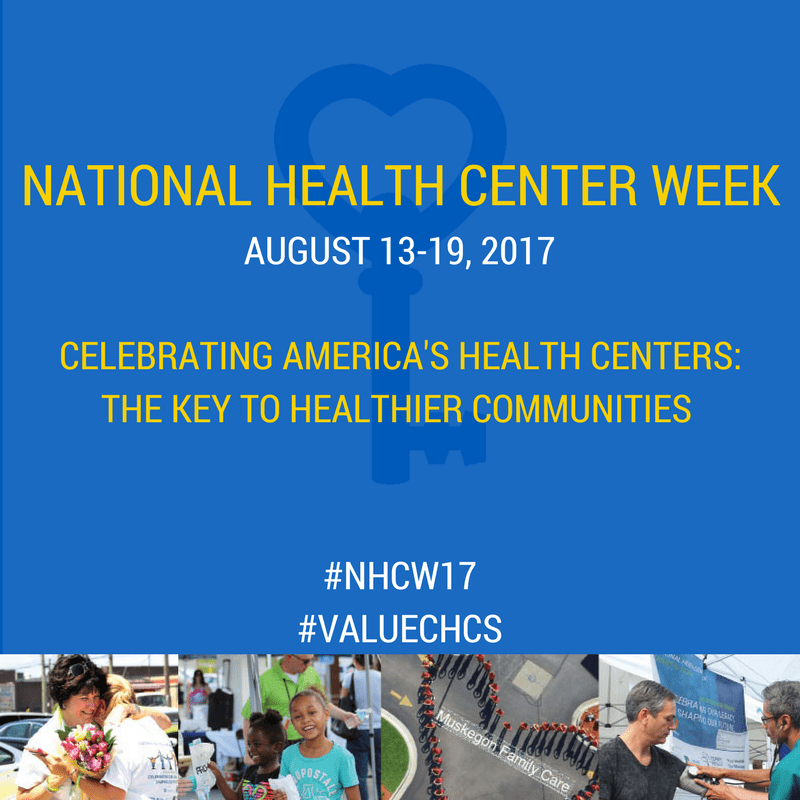
August 14, 2017 – Authors: Durado Brooks, MD, MPH and James Hotz, MD
August 13-19, 2017 is National Health Center Week (NHCW) and this year’s theme is “Celebrating America’s Health Centers: The Key to Healthier Communities.” Today you’ll hear from Durado Brooks, MD, MPH and James Hotz, MD, co-chairs of NCCRT’s Community Health Center Task Group on the critical role that health centers play in increasing access to colorectal cancer screening.
Durado Brooks, MD, MPH, Vice President, Cancer Control Interventions, has worked for the American Cancer Society since 2000, focused on strategies to improve the prevention and early detection of cancer and reduce cancer disparities. A graduate of the Ohio State University, he attended medical school and completed his internal medicine residency at Wright State University School of Medicine. He received his MPH at Harvard, and practiced primary care medicine in community health centers in Ohio and in Dallas, TX.
James Hotz, MD founded Albany Area Primary Health Care, a community health center with 21 clinical sites serving over 36,000 poor and rural patients in Southwest Georgia, where he serves as Clinical Services Director. He is an Associate Clinical Professor at Mercer University’s School of Medicine and is the former chairman of the Board of Phoebe Putney Memorial Hospital and the Georgia Association for Primary Health Care. He served two terms on the Board of Directors of the National Association of Community Health Centers. Dr. Hotz currently serves on the Board of Directors of the Cancer Coalition of South Georgia and is chair of the Steering Committee of the Georgia State Cancer Plan and the Georgia Colorectal Cancer Roundtable. He has a MD from Ohio State University and completed his Internal Medicine Internship and Residency at Emory University School of Medicine.
With more than 9,000 delivery sites in all 50 states, the District of Columbia, Puerto Rico and U.S. territories, community health centers deliver a critical network of care to over 25 million Americans. In fact, one in every fifteen people in the United States rely on health centers for quality, affordable health care.
Heath centers serve all people, regardless of who they are, where they are from, and whether or not they have health insurance. For this reason, health centers play a critical role in providing primary and preventive care services to adults who might not otherwise have access to these services, including colorectal cancer screening.
What better day than Health Screenings Day of National Health Center Week (NHCW) to reflect on the incredible progress health centers are making in the fight against colorectal cancer. But first, we’ll share a bit of history on how NCCRT and the National Association of Community Health Centers (NACHC) have teamed up to support health centers in making screening for colorectal cancer a priority.
A confluence of factors made 2011 an ideal time to launch a major effort to prioritize colorectal cancer screening in health centers. The Health Resources and Services Administration (HRSA) was gearing up to begin requiring health centers to track and report colorectal cancer screening rates in the Uniform Data System (UDS), HRSA’s core tracking system for reviewing the operation and performance of health centers. Simultaneously, experts began encouraging health centers to become recognized as patient-centered medical homes. Health centers were going through a period of major transformation, experiencing significant growth, and installing new systems at a time when the new UDS requirements were motivating them to improve the delivery of quality colorectal cancer screening.
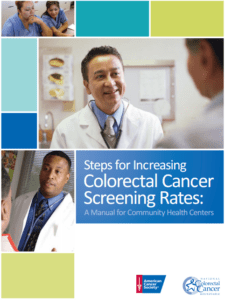 Also in 2011, the NCCRT established our Community Health Center Task Group, partnered with NACHC to convene a summit on increasing colorectal cancer screening in community health centers, and commissioned a strategy paper on the same topic, which was subsequently used to inform the NCCRT’s signature resource for health centers: Steps for Increasing Colorectal Cancer Screening Rates: A Manual for Community Health Centers. Not long after, NACHC and HRSA became two of the very first organizations to sign the 80% by 2018 pledge, and ever since NCCRT, NACHC, and HRSA have collaborated to provide countless resources, tools, and trainings to support health centers in working together on this shared goal.
Also in 2011, the NCCRT established our Community Health Center Task Group, partnered with NACHC to convene a summit on increasing colorectal cancer screening in community health centers, and commissioned a strategy paper on the same topic, which was subsequently used to inform the NCCRT’s signature resource for health centers: Steps for Increasing Colorectal Cancer Screening Rates: A Manual for Community Health Centers. Not long after, NACHC and HRSA became two of the very first organizations to sign the 80% by 2018 pledge, and ever since NCCRT, NACHC, and HRSA have collaborated to provide countless resources, tools, and trainings to support health centers in working together on this shared goal.
Health centers have embraced the challenge, and we now have the data to show their work is generating impressive results. Colorectal cancer screening rates in health centers have jumped more than five percentage points since the launch of the 80% by 2018 initiative in 2014. UDS data for 2016 released last week show health centers have reached a remarkable 39.9% screening rate. Furthermore, as of 2016, 28 health centers have already reached the 80% goal. The map below illustrates the 2015 screening rate in each state. We’ll update this post with the 2016 map as soon as it’s available.
Today on NACHC’s blog, Dr. Richard Wender, NCCRT chair, shares an example of how Peoples Community Health Clinic of Iowa recently exceeded the 80% screening goal, skyrocketing their rates from a baseline rate of 31% in 2013. Countless other health centers are making similarly remarkable gains, including two recent 80% by 2018 National Achievement Award honorees. Learn from interviews with honorees C.L. Brumback Primary Care Clinics of Florida and Coal Country Community Health Centers of North Dakota about how they implemented evidence-based strategies to transform colorectal cancer screening delivery in their clinics.
The Community Health Center Task Group, with active engagement from HRSA and NACHC, continues to create resources to try and tackle some of the toughest challenges health centers face when it comes to creating quality colorectal cancer screening programs, including the new Paying for Colorectal Cancer Screening Patient Navigation Toolkit and guidance on using electronic health records to facilitate colorectal cancer screening. Developed in partnership with NACHC and health center experts, guidance for health centers that use eClinicalWorks is already available and new guidance for NextGen users will be available in the next few months. We are also continuing to learn and share information about how communities have been able to create the medical neighborhood needed to provide follow up colonoscopies for patients who need them through our Links of Care pilots. These are tough problems with no easy answers, but we are always trying to learn and offer the best advice we can and invite people to send their challenges or solutions to us.
And we know the work takes patience and determination; there is no magic bullet to increasing screening rates. The health centers that are seeing the largest gains are committing time and resources to thoroughly and honestly examine their workflows, implement evidence-based quality improvement strategies, measure progress, and course correct. The work takes dedication, but the rewards could not be more important.
We hope you’ll join us in sharing a round of applause for our nation’s health centers. Visit www.healthcenterweek.org to learn more about National Health Center Week and find ways to show your appreciation for their work.
We Highlight Successes, Leaders, Best Practices, And Tools That Are Making An Impact In The Nationwide Movement To Reach 80% Screened For Colorectal Cancer.
Do you have a suggestion for a future blog topic? We welcome you to share your suggestions by emailing [email protected].
Blog Policy
Opinions expressed in these blog posts are that of the author and do not represent policies of the National Colorectal Cancer Roundtable or the author’s institution.
Our staff moderate all comments on the 80% Blog. While we do not censor based on point of view, we will delete or edit comments that are offensive or off topic. Click here to view full version.
© 2025 American Cancer Society National Colorectal Cancer Roundtable. All rights reserved.
